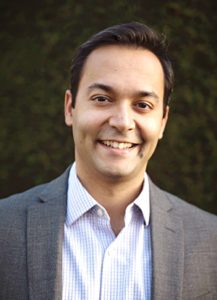October 7-10
Singapore
E-Learn Speakers Test
Wednesday October 18th, 10am
Rajiv Jhangiani, Kwantlen Polytechnic University, Canada
Open: The Philosophy and Practices That Are Revolutionizing Education and Science

Rajiv Jhangiani, Kwantlen Polytechnic University, Canada
Higher education may be a vehicle for economic and social mobility, yet it is often structured in a way that reinforces existing inequalities. Consider for example the crushing burden of student loan debt and that a majority of students in North America do not purchase at least some of their course textbooks because of their high cost. Likewise consider that publicly-funded research that is enhanced by publicly-subsidized peer review is routinely gifted to commercial publishing companies and thereby made unavailable to the taxpaying public or those in the developing world. Or that contemporary science strongly incentivizes the adoption of questionable research practices and trading off unsexy but cumulative research for flashy but non-reproducible findings.
It is against this backdrop that the open education, open access, and open science movements have been running separate—if parallel—courses, steadily transforming the higher education landscape in the process. In each case, digital technologies are being leveraged to enhance access, agency, and rigour in the service of both justice and progress. This talk will make explicit the shared foundation of these movements, showcase their disruptive potential through a few representative case studies, and critically reflect on both their pitfalls and future potential.
Dr. Rajiv Jhangiani is the University Teaching Fellow in Open Studies and a Psychology Professor at Kwantlen Polytechnic University, Surrey, Canada, where he conducts research in open education and the scholarship of teaching and learning. A recipient of the Robert E. Knox Master Teacher Award from UBC and the Dean of Arts Teaching Excellence award at KPU, Dr. Jhangiani serves as the Senior Open Education Advocacy and Research Fellow with BCcampus, an Associate Editor of Psychology Learning and Teaching, and a faculty workshop facilitator with the Open Textbook Network. Dr. Jhangiani’s most recent book is titled Open: The Philosophy and Practices that are Revolutionizing Education and Science (2017, Ubiquity Press, CC-BY).
Thursday October 19th
Linda Harasim, Simon Fraser University, Canada
Artificial Intelligence and Collaborative Learning: Designing 21st Century E-Learning

Linda Harasim, Simon Fraser University, Canada
E-learning today is on the precipice of unprecedented civilizational and technological challenges. This presentation explores how meeting these challenges can open new vistas for e-learning, based on the successful integration of two disparate components: Artificial Intelligence (AI) and Collaborative Learning (CL). AI is driving technological development in all sectors of human endeavor, surpassing humans in both physical and cognitive performance. The fundamental question and challenge today is: Can AI technology be designed to support and advance human learning, creativity, innovation and productivity rather than replacing it? And if so, how?
Collaborativism, as a theory of online learning, focuses on what we have learned during the last century about how humans learn best: discourse and intentional collaboration. For hundreds of thousands of years, advances in civilization have been based on the development of technologies that support collaboration within our species. It is time to explore how AI might be designed to AUGMENT human learning rather than supercede it, by using collaborativist theory and pedagogy to frame e-learning research, development, practice and technology worldwide.
Linda Harasim, a Professor of Communication at Simon Fraser University, Vancouver, Canada, is a pioneer in the field of online education and e-learning. In 1986 she conceptualized, designed and taught the first-ever online university course using the Internet (a graduate course at the Ontario Institute for Studies in Education – OISE), within the Graduate School of Education at the University of Toronto. Drawing from the best of what we have learned over the last century about how humans learn best, Harasim has been teaching online, conducting research, publishing, and building the field for 35 years. She pioneered the pedagogy of online collaborative learning and developed the Collaborativist Theory of Learning. She has served as senior consultant for many large-scale programs, designing the University of Phoenix Online, designing the first online training system for the Bank of Montreal, and providing training for a number of universities and organizations worldwide. She is considered a luminary in the field, having published 6 books on the subject of online education and e-learning, 15 book chapters, 25 refereed articles, and 30 keynote presentations around the world. Her writings have been translated into Spanish, Portuguese, Norwegian, and Chinese.
In 1995, Dr. Harasim founded and became the Network Leader and CEO of Canada’s TeleLearning Network of Centers of Excellence, a seven-year, $50 million program to study, develop, and commercialize elearning technologies, pedagogies and knowledge. She is currently studying how Collaborativist Learning Theory can be used to refocus the design of AI to augment, rather than replace, human intelligence.
Invited Speakers
Wednesday October 18th, 10am
Rajiv Jhangiani, Kwantlen Polytechnic University, Canada
Open: The Philosophy and Practices That Are Revolutionizing Education and Science

Rajiv Jhangiani, Kwantlen Polytechnic University, Canada
Higher education may be a vehicle for economic and social mobility, yet it is often structured in a way that reinforces existing inequalities. Consider for example the crushing burden of student loan debt and that a majority of students in North America do not purchase at least some of their course textbooks because of their high cost. Likewise consider that publicly-funded research that is enhanced by publicly-subsidized peer review is routinely gifted to commercial publishing companies and thereby made unavailable to the taxpaying public or those in the developing world. Or that contemporary science strongly incentivizes the adoption of questionable research practices and trading off unsexy but cumulative research for flashy but non-reproducible findings.
It is against this backdrop that the open education, open access, and open science movements have been running separate—if parallel—courses, steadily transforming the higher education landscape in the process. In each case, digital technologies are being leveraged to enhance access, agency, and rigour in the service of both justice and progress. This talk will make explicit the shared foundation of these movements, showcase their disruptive potential through a few representative case studies, and critically reflect on both their pitfalls and future potential.
Dr. Rajiv Jhangiani is the University Teaching Fellow in Open Studies and a Psychology Professor at Kwantlen Polytechnic University, Surrey, Canada, where he conducts research in open education and the scholarship of teaching and learning. A recipient of the Robert E. Knox Master Teacher Award from UBC and the Dean of Arts Teaching Excellence award at KPU, Dr. Jhangiani serves as the Senior Open Education Advocacy and Research Fellow with BCcampus, an Associate Editor of Psychology Learning and Teaching, and a faculty workshop facilitator with the Open Textbook Network. Dr. Jhangiani’s most recent book is titled Open: The Philosophy and Practices that are Revolutionizing Education and Science (2017, Ubiquity Press, CC-BY).
